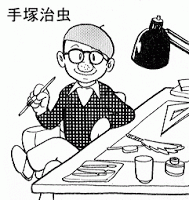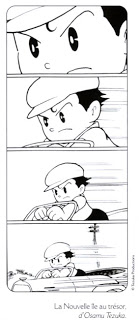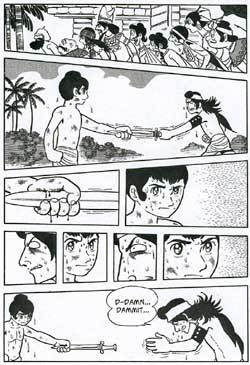Dernière mise à jour : juin 27th, 2022 at 03:01 pm
Let’s take advantage of the movie actuality with the release of Astro Boy (2009) by David Bowers, to have a quick look on Osamu Tezuka, the creator of this character and his work.
Osamu Tezuka:
An essential artist in the manga history

While most Europeans do not know his name, you should know that Osamu Tezuka is an essential artist in the manga history. The Japanese equivalent of Hergé for franco-belgian comics or of the Stan Lee/Jack Kirby duo for comics, bringing this art to a previously unimaginable level.
In 1947, he met success with New Treasure Island, an adaptation of the Robert L. Stevenson novel, striking by its cartoon style and his cinematic aspect (look at the image below).

The 50’s will see the debut of his most famous series : Astro Boy, and Kimba the White Lion, shamelessly plagiarized by Disney’s The Lion King. Tezuka, prolific author if any, publishes numerous other series including all types, as fairy princess (Princess Knight), science fiction (Lost World, Next World), or medical (Black Jack). Tezuka published during his life more than 700 original works.
As time goes by, he develop stories more and more adults and address periods and subjects more difficult. Among his masterpieces, we note especially his adaptation of The Life of Buddha and The History of Three Adolf, following the destinies of three characters sharing the same name which one is Hitler. This shift to deeper stories and denser is felt particularly in the Phoenix series that has accompanied more than 30 years, from 1954 to 1988.
A prolific work
with an incredible quality

In 1989, Osamu Tezuka died from cancer. His drawing board has accompanied him in his hospital room, where he worked on two unfinished works, Beethoven and Gringo. Sensing the end was coming, Tezuka realized some autobiographical boards particularly poignant, published at the conclusion of Gringo.
Tezuka left behind a prolific work, which we note the incredible quality and especially the incredibly humanistic message.
— Osamu Tezuka
[amazonjs asin=”1616558601″ locale=”UK” title=”Astro Boy Omnibus Volume 1″] [amazonjs asin=”1616558601″ locale=”US” title=”Astro Boy Omnibus Volume 1″]
 Bulles de Culture Sur Bulles de Culture, chaque jour, la culture sort de sa bulle !
Bulles de Culture Sur Bulles de Culture, chaque jour, la culture sort de sa bulle !
